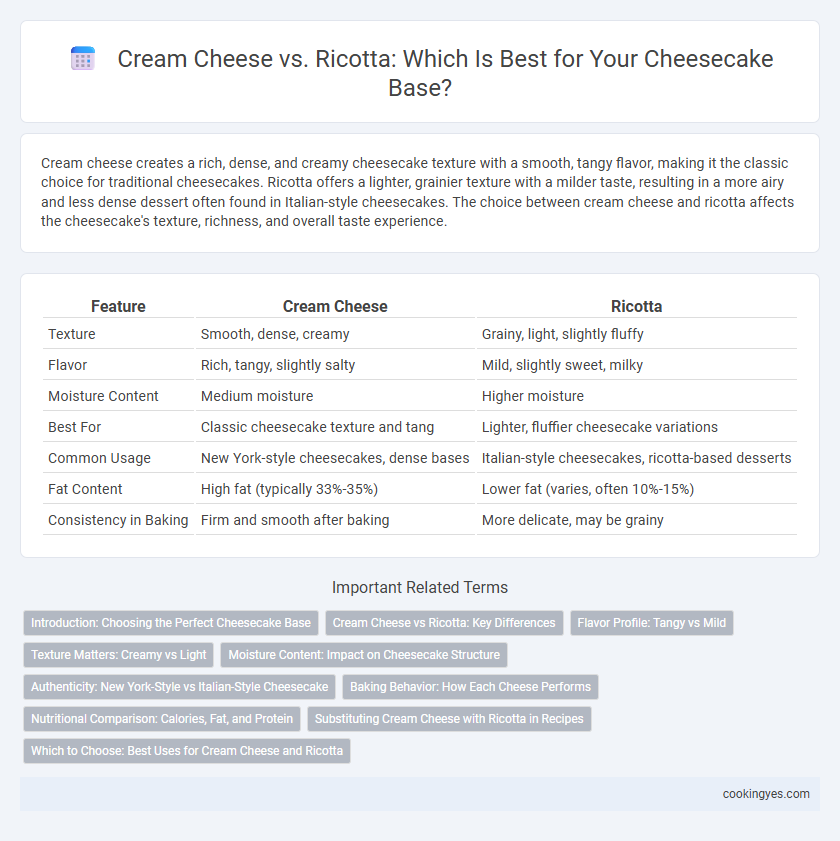Cream cheese creates a rich, dense, and creamy cheesecake texture with a smooth, tangy flavor, making it the classic choice for traditional cheesecakes. Ricotta offers a lighter, grainier texture with a milder taste, resulting in a more airy and less dense dessert often found in Italian-style cheesecakes. The choice between cream cheese and ricotta affects the cheesecake's texture, richness, and overall taste experience.
Table of Comparison
| Feature | Cream Cheese | Ricotta |
|---|---|---|
| Texture | Smooth, dense, creamy | Grainy, light, slightly fluffy |
| Flavor | Rich, tangy, slightly salty | Mild, slightly sweet, milky |
| Moisture Content | Medium moisture | Higher moisture |
| Best For | Classic cheesecake texture and tang | Lighter, fluffier cheesecake variations |
| Common Usage | New York-style cheesecakes, dense bases | Italian-style cheesecakes, ricotta-based desserts |
| Fat Content | High fat (typically 33%-35%) | Lower fat (varies, often 10%-15%) |
| Consistency in Baking | Firm and smooth after baking | More delicate, may be grainy |
Introduction: Choosing the Perfect Cheesecake Base
Cream cheese offers a rich, smooth texture and tangy flavor that defines classic American cheesecake, creating a dense and creamy base. Ricotta, in contrast, provides a lighter, grainier consistency with a mild taste, often used in Italian-style cheesecakes for a fluffier result. Selecting between cream cheese and ricotta significantly impacts the cheesecake's texture and flavor profile, influencing the dessert's overall appeal and authenticity.
Cream Cheese vs Ricotta: Key Differences
Cream cheese offers a smooth, dense texture and tangy flavor essential for a classic, rich cheesecake base, providing stability and creaminess during baking. Ricotta has a lighter, grainier consistency with a milder taste, resulting in a fluffier, less dense cheesecake variant often preferred in Italian-style recipes. Choosing between cream cheese and ricotta affects moisture content, texture, and overall richness, making cream cheese ideal for traditional American cheesecakes and ricotta suited for lighter, textured desserts.
Flavor Profile: Tangy vs Mild
Cream cheese offers a rich, tangy flavor that defines the classic cheesecake experience, providing a smooth and slightly tart taste. Ricotta has a mild, subtly sweet flavor with a lighter, grainier texture that produces a more delicate cheesecake base. Choosing cream cheese results in a denser, creamier cheesecake, whereas ricotta creates a lighter and less tangy dessert.
Texture Matters: Creamy vs Light
Cream cheese provides a rich, dense, and creamy texture that is ideal for classic New York-style cheesecakes, offering a smooth mouthfeel that holds its shape well. Ricotta lends a lighter, slightly grainy texture, resulting in a more airy and delicate cheesecake often favored in Italian-style recipes. Choosing between cream cheese and ricotta directly impacts the cheesecake's richness and firmness, influencing both taste and presentation.
Moisture Content: Impact on Cheesecake Structure
Cream cheese has a lower moisture content compared to ricotta, resulting in a denser and creamier cheesecake structure, while ricotta's higher moisture content produces a lighter, fluffier texture. The moisture in ricotta can lead to a slightly more fragile crust and may require adjustments in baking time to prevent excess sogginess. Choosing cream cheese or ricotta directly influences the cheesecake's consistency and moisture retention, impacting both mouthfeel and structural stability.
Authenticity: New York-Style vs Italian-Style Cheesecake
Cream cheese is the key ingredient for authentic New York-style cheesecake, providing a dense, smooth texture and rich flavor that defines its classic profile. Ricotta, commonly used in Italian-style cheesecake, offers a lighter, grainier consistency and a subtly sweet taste that reflects traditional Italian dessert heritage. Choosing cream cheese versus ricotta shapes the cheesecake's authenticity, distinguishing the iconic New York firmness from the delicate, airy qualities of Italian versions.
Baking Behavior: How Each Cheese Performs
Cream cheese offers a smooth, dense texture that provides a rich, creamy base ideal for classic baked cheesecakes, as it holds its form well during baking and results in a velvety finish. Ricotta, with its lighter, grainier consistency, produces a more delicate, airy cheesecake that may require additional stabilizers like eggs or flour to maintain structure and prevent crumbling. The higher fat content in cream cheese also contributes to better moisture retention and a firmer set, while ricotta's higher moisture can lead to a softer, slightly crumbly texture when baked.
Nutritional Comparison: Calories, Fat, and Protein
Cream cheese contains approximately 99 calories, 10 grams of fat, and 2 grams of protein per ounce, making it richer and creamier for a traditional cheesecake base. Ricotta has about 50 calories, 4.5 grams of fat, and 3.5 grams of protein per ounce, offering a lighter and slightly higher-protein alternative. Choosing between cream cheese and ricotta affects the cheesecake's texture and nutritional profile, with cream cheese delivering more fat and calories, while ricotta provides a lower-fat option with more protein.
Substituting Cream Cheese with Ricotta in Recipes
Substituting cream cheese with ricotta in cheesecake recipes alters the texture and flavor, as ricotta offers a lighter, grainier consistency and a milder taste compared to the dense, tangy nature of cream cheese. Ricotta-based cheesecakes may require additional binders like eggs or gelatin to maintain structure and prevent crumbling. Adjustments in sugar and lemon juice levels can balance the subtle sweetness and freshness when using ricotta instead of cream cheese in classic cheesecake preparations.
Which to Choose: Best Uses for Cream Cheese and Ricotta
Cream cheese provides a rich, tangy flavor and smooth texture ideal for classic New York-style cheesecakes, delivering the creamy consistency that defines this dessert. Ricotta, with its lighter, grainier texture and mild taste, works best in Italian-style cheesecakes, offering a fluffier base that complements fresh fruit toppings. Choosing between cream cheese and ricotta depends on the desired cheesecake style and texture, where cream cheese ensures dense richness and ricotta contributes a delicate, airy quality.
Cream cheese vs ricotta for cheesecake base Infographic

 cookingyes.com
cookingyes.com